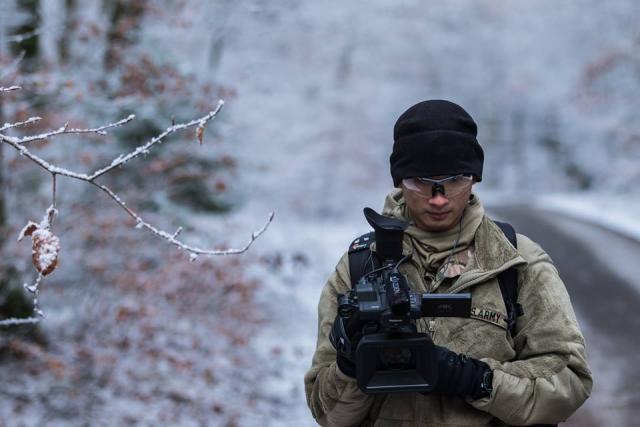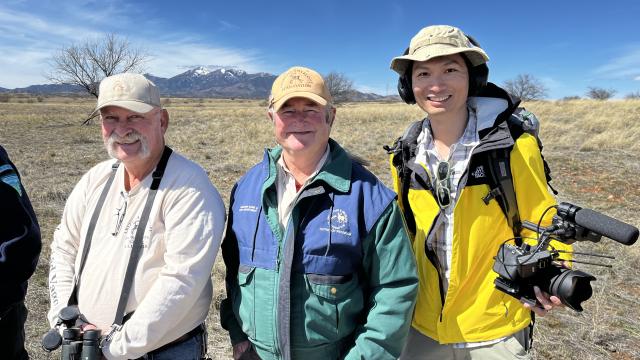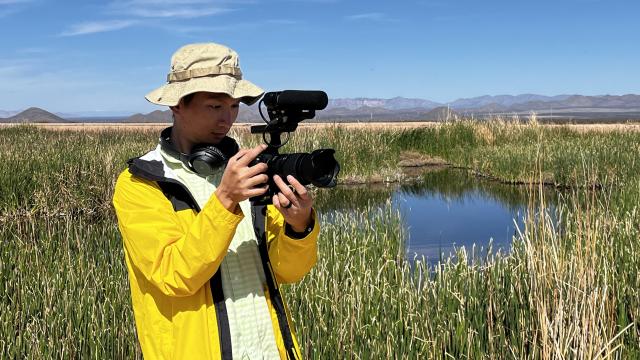You are viewing ARCHIVED content published online before January 20, 2025. Please note that this content is NOT UPDATED, and links may not work. Additionally, any previously issued diversity, equity, inclusion or gender-related guidance on this webpage should be considered rescinded. For current information, visit https://www.blm.gov/blog.
Pathways to Public Service: Liem Huynh
For Liem Huynh (pronounced LEE-em HU-win), after six years of service as a Public Affairs Specialist in the U.S. Army, it felt like a natural next step to join the BLM’s National Training Center as an Audio-Visual Production Specialist. But the full story of how Liem came to work for the Bureau in April 2023 is a remarkable one. His story also reflects importantly on the larger narrative of the BLM itself, as it continues to meet the mission by building a more diverse and inclusive workforce.
Liem started life in a small town in central Vietnam. In 2006, he and his parents, along with his brother, moved to Minneapolis, Minnesota. He graduated from high school there and earned a degree in Digital Video and Media Production. Then, in 2015, seeking to leverage his skills in audio-visual production, he enlisted in the U.S. Army and completed his Military Occupational Specialty as a Public Affairs Specialist at the Defense Information School in Fort Meade, Maryland.

Army 22nd Mobile Public Affairs Detachment.
What followed was, as Liem himself describes, something of a whirlwind: a first deployment to South America to support the U.S. military’s effort on the Zika virus; being tasked with telling the story of communities hard hit by Hurricane Harvey and how the U.S. Army assisted them; a subsequent deployment to Europe to help focus attention on U.S. partnerships with allies there; and then further service back in the United States, where Liem provided critical assistance during the COVID-19 pandemic and helped soldiers exercise their right to vote during the 2020 elections.
These experiences changed Liem dramatically. Entering the Army as a shy, quiet kid, Liem felt compelled to live and work with others from a range of backgrounds who were often both outgoing and outspoken. His military service provided valuable lessons in how diverse and inclusive teams—using what he calls a “multi-angled” approach—are stronger and more effective than more homogenous teams adhering to a “my-way-or-no-way” approach.
Liem brought these lessons with him to the BLM, where he continues his prior mission of public service.

shoot for a BLM production featuring the Sky Islands Restoration Landscape in Arizona in
March 2024. Photo Credit: Rem Hawes, BLM.
“I see a real continuity between defending freedom and protecting the nation when I was in the Army and working to conserve, restore, and protect the nation’s resources, today and into the future, now that I’m working for the BLM,” he says.
For this reason, and also because of the respectful, supportive staff he feels privileged to team up with at the National Training Center, Liem has made a seamless transition to the BLM. Likewise, the Bureau’s emphasis on having a diverse and inclusive workforce aligns with what Liem encountered during his military service, when he learned firsthand how different experiences and skills team members bring to the table can enhance mission readiness. Liem noted another parallel: given that the public the Bureau serves is itself becoming more diverse, the agency, like the U.S. military, must keep pace, drawing on its own range of viewpoints and experiences to find sustainable solutions to contemporary challenges.
Liem shared some parting thoughts about his Asian American heritage, stressing the variety of the regions, languages, and traditions falling under the Asian American, Native Hawaiian, and Pacific Islander umbrella. He commented on the importance of recognizing and engaging with specific communities within this very large grouping, to promote more effective communication between the Bureau and Vietnamese Americans, Korean Americans, Japanese Americans, and many others.

Landscape in Arizona in March 2024. Photo Credit: Rem Hawes, BLM.
Within the BLM itself, Liem highlighted the importance of complementing diversity with inclusivity, so that people of color feel represented and know that their voices are being heard in decision-making processes.
Holding up both hands, he said, “As a person who specializes in audio-visual production, let me leave you with an image! All the fingers on my hands represent diversity. But inclusion happens when my fingers interlock, like so.”
The BLM can draw inspiration from Liem Huynh’s visual metaphor, not to mention his life story, as the agency extends its own narrative into the 21st century and beyond.
Story by David Herman, Writer/Editor, BLM Experienced Services Program
Related Stories
- Overcoming challenges to move the BLM forward: Nikki Haskett
- BLM recreation sites available to all: Exploring accessibility on Arizona’s public lands
- Connecting Utah students to public lands careers
- A day in the life of a BLM Hobbs Petroleum Engineering Technician
- BLM Recreation Sites Available to All: Exploring Accessibility on Alaska’s Public Lands
